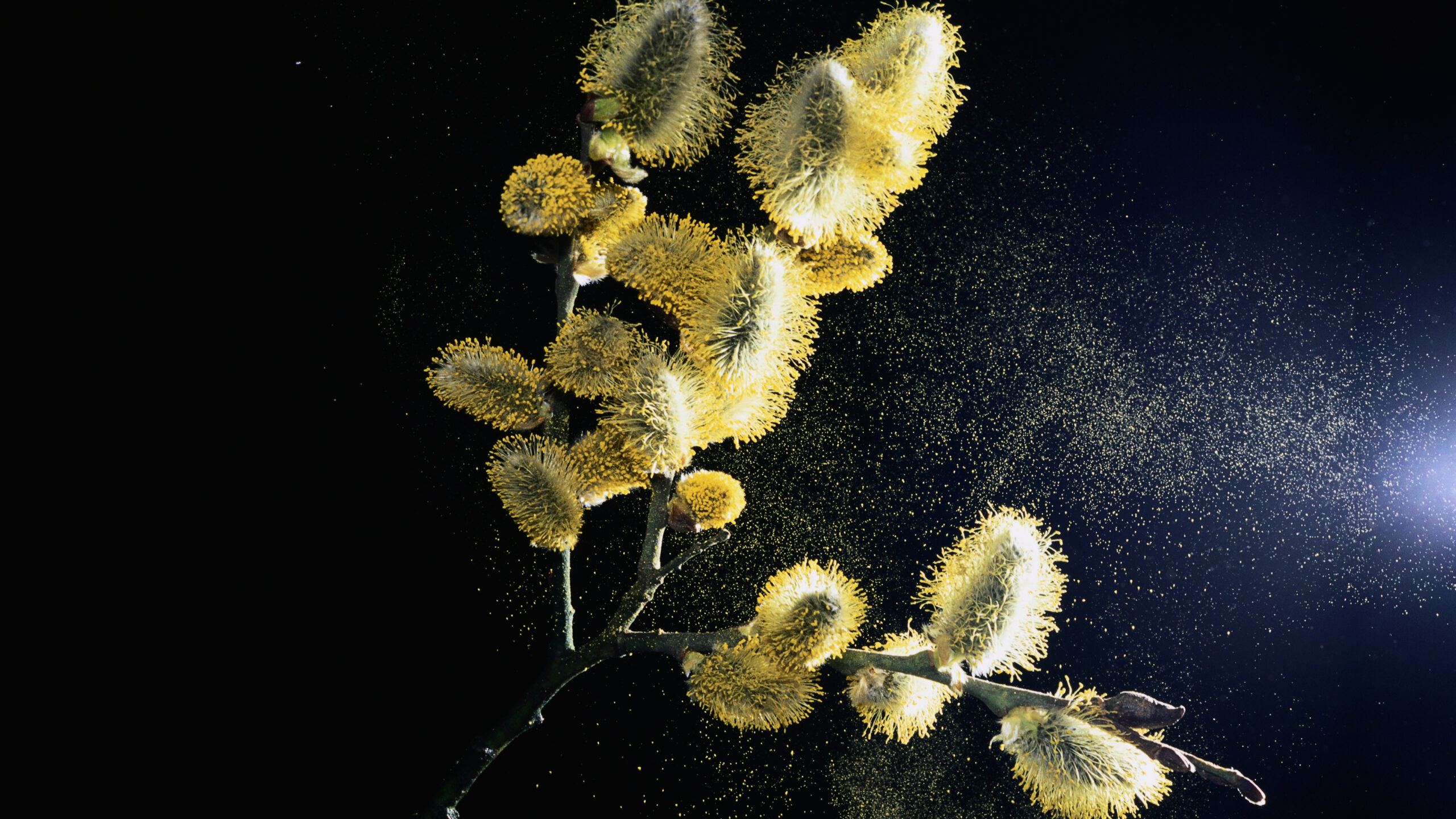Science
Researchers Transform Pollen into Eco-Friendly Materials

Pollen, often dismissed as mere dust, is gaining recognition for its potential in creating eco-friendly materials. Researchers at Singapore’s Nanyang Technological University, led by Nam-Joon Cho, are pioneering innovative methods to transform pollen into useful products such as paper, sponges, and films. This groundbreaking work opens new avenues for sustainable materials that could reduce reliance on traditional resources.
In Cho’s laboratory, the focus is on modifying the tough outer shell of pollen grains, composed of a biopolymer known as sporopollenin. For over a decade, Cho has refined techniques to soften this shell, enabling the grains to take on a jam-like consistency. This transformation, achieved through a process involving an alkaline solution of potassium hydroxide at elevated temperatures, allows pollen to absorb water and become pliable.
The resulting microgel can be easily shaped into various forms. As Shahrudin Ibrahim, a research fellow in Cho’s lab, describes, before treatment, pollen grains are similar to marbles—hard and inert. After the process, they become soft and adhesive, facilitating the creation of more complex structures. This has significant implications for developing new materials.
Innovative Applications and Environmental Benefits
Cho’s team has demonstrated that the microgel can be cast into molds to produce flexible and strong films. These films are not only versatile but also responsive to environmental changes, making them suitable for advanced applications like smart actuators and wearable health monitors. The researchers believe that, due to its natural UV protection, pollen-derived materials could also play a role in enhancing solar cells and other optoelectronic devices.
Moreover, the environmental benefits of using pollen are substantial. Traditional paper production is resource-intensive, consuming up to 13 liters of water for each page. In contrast, pollen is readily available and can be harvested without destroying plants. A single sunflower floret can produce between 25,000 and 67,000 grains each summer, providing a sustainable source of material.
Cho’s team primarily works with sunflower and camellia pollen, which they purchase from suppliers, often as a bee pollen mixture. Their innovative alkaline hydrolysis method has the potential to work with various plant species, expanding the possibilities for resource-efficient materials.
Future Prospects and Challenges
Despite the promising applications, challenges remain before pollen-based products can reach the market. Ibrahim emphasizes the importance of anticipating these challenges and developing sustainable solutions. Unlike other biomaterials, such as chitosan derived from crustaceans or cellulose from trees, using pollen does not involve the destruction of plants or their flowers.
As the researchers continue to refine their techniques, the potential for pollen as a valuable biomaterial is becoming increasingly clear. The work of Cho and his colleagues demonstrates that with innovation, what many consider waste can be transformed into sustainable resources.
This research highlights the importance of looking at common materials in new ways. The insights gained from Cho’s lab not only contribute to materials science but also underscore a growing movement towards sustainability in product development. As scientists like Noemi Csaba from the University of Santiago de Compostela explore further applications of pollen, the future of this versatile material looks bright.
This article originally appeared in Knowable Magazine, a nonprofit publication dedicated to making scientific knowledge accessible to all.
-

 Education4 months ago
Education4 months agoBrandon University’s Failed $5 Million Project Sparks Oversight Review
-

 Science5 months ago
Science5 months agoMicrosoft Confirms U.S. Law Overrules Canadian Data Sovereignty
-

 Lifestyle5 months ago
Lifestyle5 months agoWinnipeg Celebrates Culinary Creativity During Le Burger Week 2025
-

 Health5 months ago
Health5 months agoMontreal’s Groupe Marcelle Leads Canadian Cosmetic Industry Growth
-

 Science5 months ago
Science5 months agoTech Innovator Amandipp Singh Transforms Hiring for Disabled
-

 Technology5 months ago
Technology5 months agoDragon Ball: Sparking! Zero Launching on Switch and Switch 2 This November
-

 Education5 months ago
Education5 months agoNew SĆIȺNEW̱ SṮEȽIṮḴEȽ Elementary Opens in Langford for 2025/2026 Year
-

 Education5 months ago
Education5 months agoRed River College Launches New Programs to Address Industry Needs
-

 Business4 months ago
Business4 months agoRocket Lab Reports Strong Q2 2025 Revenue Growth and Future Plans
-

 Technology5 months ago
Technology5 months agoGoogle Pixel 10 Pro Fold Specs Unveiled Ahead of Launch
-

 Top Stories4 weeks ago
Top Stories4 weeks agoCanadiens Eye Elias Pettersson: What It Would Cost to Acquire Him
-

 Technology3 months ago
Technology3 months agoDiscord Faces Serious Security Breach Affecting Millions
-

 Education5 months ago
Education5 months agoAlberta Teachers’ Strike: Potential Impacts on Students and Families
-

 Business1 month ago
Business1 month agoEngineAI Unveils T800 Humanoid Robot, Setting New Industry Standards
-

 Business5 months ago
Business5 months agoBNA Brewing to Open New Bowling Alley in Downtown Penticton
-

 Science5 months ago
Science5 months agoChina’s Wukong Spacesuit Sets New Standard for AI in Space
-

 Lifestyle3 months ago
Lifestyle3 months agoCanadian Author Secures Funding to Write Book Without Financial Strain
-

 Business5 months ago
Business5 months agoNew Estimates Reveal ChatGPT-5 Energy Use Could Soar
-

 Business3 months ago
Business3 months agoHydro-Québec Espionage Trial Exposes Internal Oversight Failures
-

 Business5 months ago
Business5 months agoDawson City Residents Rally Around Buy Canadian Movement
-

 Technology5 months ago
Technology5 months agoFuture Entertainment Launches DDoD with Gameplay Trailer Showcase
-

 Top Stories4 months ago
Top Stories4 months agoBlue Jays Shift José Berríos to Bullpen Ahead of Playoffs
-

 Technology5 months ago
Technology5 months agoWorld of Warcraft Players Buzz Over 19-Quest Bee Challenge
-

 Top Stories3 months ago
Top Stories3 months agoPatrik Laine Struggles to Make Impact for Canadiens Early Season










